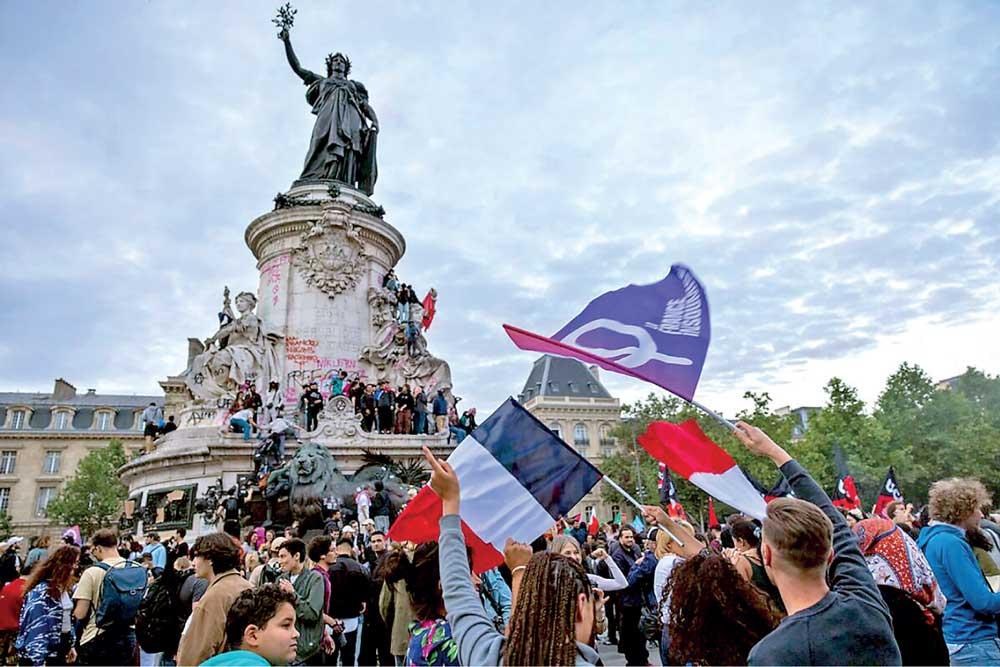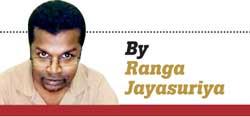10 Jul 2024 - {{hitsCtrl.values.hits}}

The French experience at the concluded election offers an important lesson of political commonsense and the bare minimum of altruism for the common good
 Early this week, with the far-right knocking at the gates of government power, France pulled off a miraculous comeback to defend the Fifth Republic.
Early this week, with the far-right knocking at the gates of government power, France pulled off a miraculous comeback to defend the Fifth Republic.
After the far-right and anti-immigrant National Rally won the first round, with projected votes of 260-280 seats, a tad shy of the absolute majority of 579 members of the National Assembly, the usually bickering political parties of the left, right, and centre joined ranks to stop the formation of the first far- right since the World War II.
In order to prevent the split of the Republican vote in a three-way race, hundreds of candidates who came third in the first round withdrew from the contest to allow the better-placed anti-far right candidate to win the race.
(According to Le Monde, all but 33 candidates who came third withdrew). Tactical withdrawals turned the race upside down. The leftist New Popular Front (NFP), a loose group of parties of the far left, moderate socialists and Greens, emerged as the largest party, winning 182 seats, followed by Macron’s Centrist Ensemble with 163. Marine Le Pen’s National Rally won 143 seats, a far cry from the first-round projections.
Tactical withdrawals
The election, and perhaps tactical withdrawals, left France with a hung Parliament, not the first in France that many French considered as umptieth times better than the demise of the Republic at the hands of the reformed former neo-Nazi party founded by Marine’s father Jean Louis Marie Le Pen who famously dismissed Nazi gas chambers as a detail of history.
French politics have little practical implication for Sri Lanka unless you are reading too much into geo politics or a wide-eyed asylum seeker who is feeding into a growing cottage industry in this part of the world.
But, the French experience at the just concluded election offers an important lesson of political commonsense and the bare minimum of altruism for the common good. That is a lesson Sri Lankan politicians should take note of. It would come in handy in the coming presidential elections (not so much the Parliamentary polls, considering Sri Lanka has first past the post system).
The Presidential election: A would-be three-way race
The presidential election would be a three-way race, pitting three main contenders, Ranil Wickremesinghe, Sajith Premadasa and Anura Kumara Dissanayake, against each other. There may be a possible Pohottuwa candidate if Wickremesinghe’s romance with the Rajapaksas hit a snag, but that cannot drastically change the outcome. There will also be other usual culprits who might run to spoil others’ chances or in exchange for a future diplomatic posting. Still, they could not significantly alter the outcome, either.
In a three-way contest, no candidate would secure 50 per cent of popular votes to win the presidency outright. The likely scenario would be that the vote would be split more or less evenly among the three contenders, leading to the counting of the second preference. This, though a provision of the election law, is an unknown and hitherto unexplored, given that the winning candidates in previous elections have managed to secure 50 per cent of the popular vote in the first count. Also, given the past practice of first-round certainty, the average voter often overlooks a second preferential vote.
The presidential election would be a three-way race, pitting three main contenders, Ranil Wickremesinghe, Sajith Premadasa and Anura Kumara Dissanayake, against each other
The count of the second preferential vote may not distort the popular will of the people. However, a three-way race designed to feed into the personal egos of the politicians complicates the process and threatens the country’s future.
Sri Lanka does not need to go for a three-way presidential election. There is even a lesser justification to do so than France. Two main contenders, President Ranil Wickremesinghe and prospective Samagi Jana Balawegaya (SJB) candidate Sajith Premadasa, were both more or less UNPers who shared the same economic vision. Premadasa and the bulk of former UNP MPs parted ways with Wickremesinghe at a time when the political fortune of the Grand Old Party was at its nadir. They blamed Wickremesinghe for their misfortune. Some even tried in vain to ape Gotabaya Rajapaksa. Since then, as Gota and the dynastic regime crashed due to the weight of its own economic mismanagement, Wickremesinghe’s luck changed. After he succeeded Gotabaya Rajapaksa as the president, he lifted the country from its worst-ever economic crisis, tamed the runaway inflation to a low single digit, and restructured its debt owed to its bilateral and commercial lenders. He is also not known to have run the country through white vans or turned the Supreme Court into a rubber stamp, though a new group of civil society activists, who were nowhere to be seen during those far more eventful years of the Rajapaksa, now cry blue murder.
Some accuse Premadasa of running away when Gotabaya offered him the post of prime minister. He might have a justifiable reason to do so, for public uproar at the time was for a system change, beginning with the resignation of Gotabaya Rajapaksa, and not for a mere cosmetic change of the Cabinet headed by elder brother Mahinda.
However, even if Premadasa accepted the offer and, by some luck, ended up in the office of president, whether he could have done any better than Wickremesinghe is a moot point because Wickremesinghe’s manifest level of fiscal discipline and disengagement from the street rhetoric during the past two years is a rarity in your average Third World politician.
Sri Lanka’s Republican Moment
The Sri Lankan economy is recovering from its worst-ever crisis, having grown in two consecutive quarters. During the last quarter, it grew at a commendable 5.2 per cent. But, it is still not out of the woods, and the wrong choices made in the presidential election would not only unravel the progress achieved so far but also herald a crisis from which Sri Lanka is unlikely to recover. This brings Sri Lanka to its ‘Republican moment”. This is also where the Sri Lankan and French experiences, though they appear starkly different on the surface, become vastly similar when the superficial layers are peeled off.
The JVP, the third contender in the race, is surely not of the far right, though where it stands on the scale of the left is unknown. It may not be racist, Islamophobic or anti-minority. In a bid to reassure the public, Anura Kumara sounds more like a moderate socialist- which would be the ideal form of government if you have a large reserve of excess wealth for redistribution, which Sri Lanka does not. Meanwhile, Lal Kantha’s village committees sound like they are straight from the Khmer Rouge’s textbooks.
Either way, anyone who has been to a Sri Lankan university where JVP-run student councils hold a monopoly of politics would not dare have a JVP government at the national level.
Workable political programme
The JVP and the National Rally have a stark similarity. Both capitalised on justifiable public grievances. In France, the National Rally has taken up the reasonable public angst at the government’s failure to manage the runaway immigration and the growing immigrant ghettos and parallel societies. In Sri Lanka, the JVP thrives on public anger about economic hardships. However, instead of offering practical solutions, both groups have thrived on exploiting the public outrage and riding on a protest vote devoid of a workable political program.
What Sri Lanka needs most at the moment is political stability and fiscal discipline. A three-way contest would not only complicate it, but it could also endanger it. There is no plausible reason for the SJB and UNP to field two candidates in a self-defeatist endeavour. It is open to question how many SJB parliamentarians think Sajith Premadasa should run against Ranil Wickremesinghe. Anyone who has not thought it over should consider the far-reaching consequences if a patricidal contest backfires, helping the JVP.
The SJB and UNP should join ranks and field a unified candidate. That ideally should be Ranil Wickremesinghe, given his proven track record during the last two years. That might even make Sajith Premadasa the prime minister of the next government. Leave aside the economy. If the election goes the other way in a three-way contest, and JVP lives truly to Marxist-Leninism, this could well be the last election Sri Lanka would have for a long time to come.
Follow @RangaJayasuriya on X
24 Nov 2024 3 hours ago
24 Nov 2024 5 hours ago
24 Nov 2024 6 hours ago
24 Nov 2024 7 hours ago